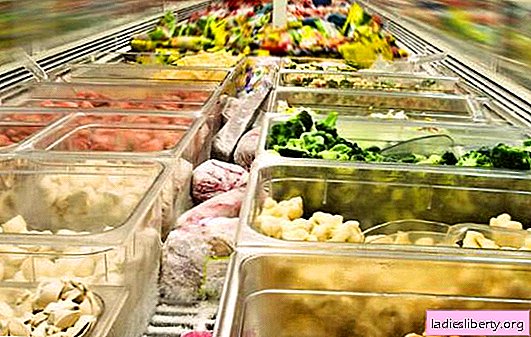
This is a fact - a huge amount of food is thrown every day. Many meat or vegetable dishes can be preserved with the correct freezing technique. However, not all products can be frozen.
Product freshness determines quality
Food should be as fresh as possible. The longer the product is frozen, the higher the quality loss. Although the quality of each meal is different, the rule nevertheless applies: the fresher, the better.
Before freezing, it is recommended to clean, dry, slice the product and put it in the freezer. Vegetables should always be pre-cut, thereby reducing the activity of enzymes. This can lead to discoloration and taste and loss of vitamins.
If the product was packaged in a freezer, care must be taken to ensure that neither air nor moisture penetrates. Otherwise, food may lose vitamins.
With a lot of air, the food dries and becomes a whitish-gray color. Affected areas are not harmful to health, but the taste suffers. Therefore, it is always necessary to seal products - preferably in vacuum packaging.
Shelf life depends on the type of product.
The following storage periods apply in the freezer:
- vegetables: from 3 to 12 months;
- meat or fish: from 3 to 12 months;
- fruits: from 9 to 12 months;
- sausage: from 1 to 6 months;
- dairy products: from 2 to 6 months;
- herbs: from 3 to 4 months;
- baking: from 1 to 3 months;
- homemade meat: 1 to 3 months.
In Russia, several million tons of food is thrown away every year. About 60% of this comes from private households, that is, an average of 82 kilograms per capita per year.
65% of these discarded food products are so-called avoidable waste. Freezing foods is one way to avoid waste. Many foods can be stored for longer by freezing.
It is recommended not to throw away food immediately.
If you have bought too many fruits and vegetables, do not immediately throw away food. Food can be frozen and then consumed. Beans, peas, various types of cabbage, carrots, spinach and greens can cope with the cold.
Similarly, meat, poultry, fish and bread, rolls, pastries and cooked foods are in good hands at low temperatures. It is important that the food is fresh and hygienic before it gets into the freezer.
Not all products are suitable for freezing.
However, not everything is suitable for storage at low temperatures. Since leafy salads, cucumbers, tomatoes, watermelons and grapes contain a lot of water, they fade or become wet after thawing.
Raw potatoes should not be stored in the freezer, because then it will taste sweet. Dairy products - yogurt, sour cream, or cereal are also prohibited from being stored in the freezer. However, homogenized milk and fresh cream can be easily frozen, just like butter.
How to freeze?
In order to make food as good as possible, it should be prepared accordingly. Basically, they should be washed and, if necessary, cleaned or ground. For most types of vegetables, freezing with rapid cooling, for example, immersion in ice water, is recommended.
However, do not season raw vegetables before freezing with salt. Because salt removes water from plant cells. Some spices, such as peppers, nutmeg, basil or dill, change the taste of food.
How to defrost food?
During the freezing process, the product must be cooled as quickly as possible so that neither vitamins nor taste are lost. When defrosting, the opposite is required: measures must be taken to ensure that frozen foods thaw very slowly and carefully.
Vegetables quickly lose their consistency if you put them directly in hot water. Meat and fish are particularly sensitive and should be removed from the freezer in the evening or refrigerated overnight.
Bacteria quickly activate after thawing, so raw frozen foods should not be frozen a second time.
Simple rules for freezing and thawing will help maintain food quality at the original level. However, it is not recommended to repeatedly freeze foods.











